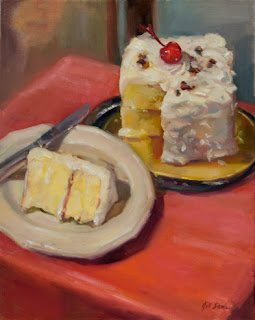I'm impressed. But not surprised. A couple of days ago I read an article about
Jacob Collins upcoming show in
American Art Collector magazine. (A great magazine for artists and art collectors.) Jacob Collins is one of the top artists in my particular art world. The article stated that after his landscape show closed in 2008, Collins took a year off from painting -- to work on improving his drawing skills. (He'd only been painting landscapes leading up to that show in 2008 to bring his landscapes up to the quality of his still life and figure work.)
 |
| My painting of "Moo" in progress with my subject... outside the comfort zone |
This is an artist whose work sells in the $5,000 to $90,000 range (again according to
American Art Collector). This is an artist who others look up to -- for his draftsmanship and the undeniable quality of work.
There's a connection here -- between quality of work and the effort/time/energy spent on honing artistic skills. (Isn't that true in every profession or pursuit?) Collins realizes that he can't ever rest on his laurels or start to think his own work is good enough. Just because he's the best one day does not mean he'll hold that title the next. Unless he commits to his art ... and to improving beyond the status quo ... over and over. That attitude and realization drove him to greatness. And that attitude will keep pushing his art to greater ... greatness.
One of the drivers of his decision to step back and concentrate on drawing was seeing the quality being created by other artists. I understand. I look around me and increasingly, there are phenomenal artists and art all around. It's inspirational. And perhaps a bit scary. But, incredibly good for art as a whole. (The competitive spirit is alive and well in the art world -- and partly because of it -- we create better art.)
And What About Me?
I always want to be the best and strive to constantly improve. Keeping my eyes open and objective about my own work drives me to reach new levels.
 |
| Painting on site ... from life ... challenging and enriching |
That goal is a big part of what drove me to commit to and complete my 100 Faces in 100 Days project this year. (I painted 100 faces, one a day, for the first 100 days of 2011, from life of volunteers, age six-and-a-half months to 97 years old.) It really was time "off" of what I normally do so I could improve skills. It was a huge commitment and it has paid off in making me a much better painter -- being realized as I return to all of the subjects that I painted pre-project -- still lifes, urban landscapes, figurative works, etc.
In reading the article about Jacob Collins, I thought about a conversation I heard about my 100 Faces project from a person analyzing this project's "worth." It was something like ... "she already knows how to paint portraits well ... why would she want to paint so many more of them." That was pretty shocking. The fact that I work at improving my work ... through whatever means I think should work ... is how I got to paint portraits ... and other genres ... well.
How Has the 100 Faces Project Affected My Work?
There's a new ease with which I can approach my work. There's less worry about how to do something -- which lets me concentrate on why I'm drawn to paint the subject and exactly what qualities I will emphasize. I get at the essence and ditch more details.
I'm still taking time to push forward. I'm doing more
plein air work (see evidence above) to use as studies for studio paintings and because
plein air painting is not my strong suit. It's not going to get better, unless I expend in the time, effort, and energy to improve.
Figuring out what to work on as an artist (and then doing it) is akin to practicing the scales for the musician. You get the mechanics down so beauty can spring forth.
Web:
www.jillbanks.com
Blog:
jillbanks.blogspot.com
100 Faces in 100 Days Project:
www.jillbanks.com/jillbanks/100_Faces_in_100_Days_Project.html
Email: jillbanks1@aol.com
Phone: 703.403.7435















































